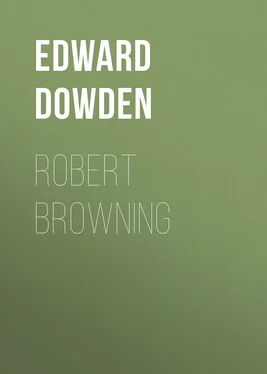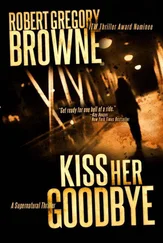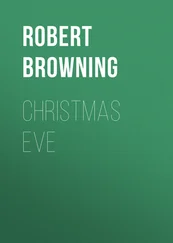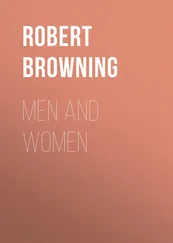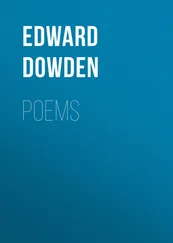Edward Dowden - Robert Browning
Здесь есть возможность читать онлайн «Edward Dowden - Robert Browning» — ознакомительный отрывок электронной книги совершенно бесплатно, а после прочтения отрывка купить полную версию. В некоторых случаях можно слушать аудио, скачать через торрент в формате fb2 и присутствует краткое содержание. Жанр: Биографии и Мемуары, Поэзия, foreign_antique, foreign_prose, foreign_poetry, на английском языке. Описание произведения, (предисловие) а так же отзывы посетителей доступны на портале библиотеки ЛибКат.
- Название:Robert Browning
- Автор:
- Жанр:
- Год:неизвестен
- ISBN:нет данных
- Рейтинг книги:5 / 5. Голосов: 1
-
Избранное:Добавить в избранное
- Отзывы:
-
Ваша оценка:
- 100
- 1
- 2
- 3
- 4
- 5
Robert Browning: краткое содержание, описание и аннотация
Предлагаем к чтению аннотацию, описание, краткое содержание или предисловие (зависит от того, что написал сам автор книги «Robert Browning»). Если вы не нашли необходимую информацию о книге — напишите в комментариях, мы постараемся отыскать её.
Robert Browning — читать онлайн ознакомительный отрывок
Ниже представлен текст книги, разбитый по страницам. Система сохранения места последней прочитанной страницы, позволяет с удобством читать онлайн бесплатно книгу «Robert Browning», без необходимости каждый раз заново искать на чём Вы остановились. Поставьте закладку, и сможете в любой момент перейти на страницу, на которой закончили чтение.
Интервал:
Закладка:
This, in brief, is the "history of a soul" which Browning has imagined in his Sordello . And the conclusion of the whole matter can be briefly stated: the primary need of such a nature as Sordello's—and we can hardly doubt that Browning would have assigned himself a place in the class to which the poet of his imagination belongs—is that of a Power above himself, which shall deliver him from egoism, and whose loyal service shall concentrate and direct his various faculties, and this a Power not unknown or remote, but one brought near and made manifest; or, in other words, it is the need of that which old religion has set forth as God in Christ. Sordello in his final decision in favour of true service to the people had, like Paracelsus, given his best praise to God, had given his highest pledge of loyalty to whatever is Divine in life. And therefore, though he has failed in all his high designs, his failure is in the end a success. He, like Paracelsus, had read that bitter sentence which declares that "collective man outstrips the individual":—
"God has conceded two sights to a man—
One, of men's whole work, time's completed plan,
The other, of the minute's work, man's first
Step to the plan's completion."
And the poor minute's work assigned him by the divine law of justice and pity he accepts as his whole life's task. It is true that though he now clearly sees the end, he has not perhaps recognised the means. If Sordello contemplated political action as his mode of effecting that minute's work, he must soon have discovered, were his life prolonged, that not thus can a poet live in his highest faculty, or render his worthiest service. The poet—and speaking in his own person Browning makes confession of his faith—can adequately serve his mistress, "Suffering Humanity," only as a poet. Sordello failed to render into song the highest thoughts and aspirations of Italy; but Dante was to follow and was not to fail. The minstrel's last act—his renunciation of selfish power and pleasure, his devotion to what he held to be the cause of the people, the cause of humanity, was indeed his best piece of poetry; by virtue of that act Sordello was not a beaten man but a conqueror.
These prolonged studies— Paracelsus, Sordello , and, on a more contracted scale, Pauline —each a study in "the development of a soul," gain and lose through the immaturity of the writer. He had, as yet, brought only certain of his faculties into play, or, at least, he had not as yet connected with his art certain faculties which become essential characteristics of his later work. There is no humour in these early poems, or (since Naddo and the critic tribe of Sordello came to qualify the assertion) but little; there is no wise casuistry, in which falsehood is used as the vehicle of truth; the psychology, however involved it may seem, is really too simple; the central personages are too abstract—knowledge and love and volition do not exhaust the soul; action and thought are not here incorporated one with the other; a deed is not the interpreter of an idea; an idea is first exhibited by the poet and the deed is afterwards set forth as its consequence; the conclusions are too patently didactic or doctrinaire; we suspect that they have been motives determining the action; our scepticism as to the disinterested conduct of the story is aroused by its too plainly deduced moral. We catch the powers at play which ought to be invisible; we fiddle with the works of the clock till it ceases to strike. Yet if only a part of Browning's mind is alive in these early poems, the faculties brought into exercise are the less impeded by one another; the love of beauty is not tripped up by a delight in the grotesque. And there is a certain pleasure in attending to prophecy which has not learnt to hide itself in casuistry. The analysis of a state of mind, pursued in Sordello with an effort that is sometimes fatiguing and not always successful, is presently followed by a superb portrait—like that of Salinguerra—painted by the artist, not the analyst, and so admirable is it that in our infirmity we are tempted to believe that the process of flaying and dissection alters the person of a man or woman as Swift has said, considerably for the worse.
Chapter III
The Maker of Plays
The publication of Paracelsus did not gain for Browning a large audience, but it brought him friends and acquaintances who gave his life a delightful expansion in its social relations. John Forster, the critic, biographer and historian, then unknown to him, reviewed the poem in the Examiner with full recognition of its power and promise. Browning gratefully commemorated a lifelong friendship with Forster, nearly a score of years later, in the dedication of the 1863 edition of his poetical works. Mrs Orr recites the names of Carlyle, Talfourd, R. Hengist Horne, Leigh Hunt, Procter, Monckton Milnes, Dickens, Wordsworth, Landor, among those of distinguished persons who became known to Browning at this period. 18 18 Dr Moncure Conway in "The Nation" vol. i. (an article written on the occasion of Browning's death) says that he was told by Carlyle of his first meeting with Browning—as Carlyle rode upon Wimbledon Common a "beautiful youth," walking there alone, stopped him and asked for his acquaintance. The incident has a somewhat legendary air.
His "simple and enthusiastic manner" is referred to by the actor Macready in his diary; "he looks and speaks more like a youthful poet than any man I ever saw." Browning's face was one of rare intelligence and full of changing expression. He was not tall, but in early years he was slight, was graceful in his movements, and held his head high. His dark brown hair hung in wavy masses upon his neck. His voice had in early manhood a quality, afterwards lost, which Mr Sharp describes as "flute-like, clear, sweet and resonant." Slim, dark, and very handsome are the words chosen by Mrs Bridell-Fox to characterise the youthful Browning as he reappeared to her memory; "And—may I hint it?"—she adds, "just a trifle of a dandy, addicted to lemon-coloured kid gloves and such things, quite 'the glass of fashion and the mould of form.' But full of ambition, eager for success, eager for fame, and, what is more, determined to conquer fame and to achieve success." Yet the correct and conventional Browning could also fire up for lawlessness—"frenetic to be free." He was hail-fellow well-met, we are told—but is this part of a Browning legend?—with tramps and gipsies, and he wandered gladly, whether through devout sympathy or curiosity of mood we know not, into Little Bethels and other tents of spiritual Ishmael.
From Camberwell Browning's father moved to a house at Hatcham, transporting thither his long rows of books, together with those many volumes which lay still unwritten in the "celle fantastyk" of his son. "There is a vast view from our greatest hill," wrote Browning; a vast view, though Wordsworth had scorned the Londoner's hill—"Hill? we call that, such as that, a rise ." Here he read and wrote, enjoyed his rides on the good horse "York," and cultivated friendship with a toad in the pleasant garden, for he had a peculiar interest, as his poems show, in creatures that live a shy, mysterious life apart from that of man, and the claim of beauty, as commonly understood, was not needed to win his regard. Browning's eye was an instrument made for exact and minute records of natural phenomena. "I have heard him say," Mr Sharp writes, "that at that time"—speaking of his earlier years—"his faculty of observation would not have appeared despicable to a Seminole or an Iroquois." Such activity of the visual nerve differs widely from the wise passiveness or brooding power of the Wordsworthian mode of contemplation. Browning's life was never that of a recluse who finds in nature and communion with the anima mundi a counterpoise to the attractions of human society. Society fatigued him, yet he would not abandon its excitements. A mystic—though why it should be so is hard to say—does not ordinarily affect lemon-coloured kid gloves, as did the Browning of Mrs Bridell-Fox's recollection. The mysticism of Browning's temper of mind came not by withdrawal from the throng of positive facts, but by pushing through these to the light beyond them, or by the perception of some spear-like shaft of light piercing the denseness, which was serviceable as the sheathe or foil. And of course it was among men and women that he found suggestions for some of his most original studies.
Читать дальшеИнтервал:
Закладка:
Похожие книги на «Robert Browning»
Представляем Вашему вниманию похожие книги на «Robert Browning» списком для выбора. Мы отобрали схожую по названию и смыслу литературу в надежде предоставить читателям больше вариантов отыскать новые, интересные, ещё непрочитанные произведения.
Обсуждение, отзывы о книге «Robert Browning» и просто собственные мнения читателей. Оставьте ваши комментарии, напишите, что Вы думаете о произведении, его смысле или главных героях. Укажите что конкретно понравилось, а что нет, и почему Вы так считаете.
